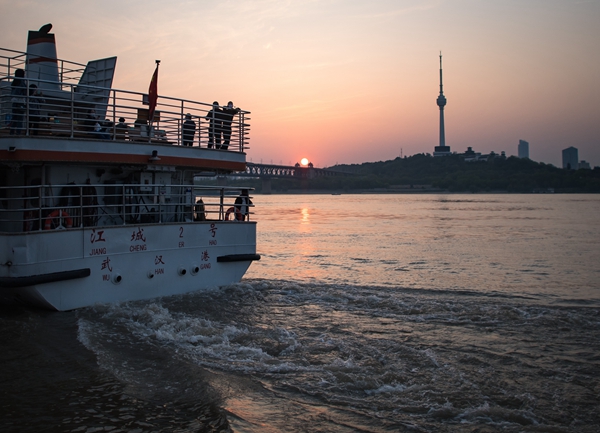Healthcare worker waves goodbye to Wuhan
- By Zhang Liying
 0 Comment(s)
0 Comment(s) Print
Print E-mail China.org.cn, April 14, 2020
E-mail China.org.cn, April 14, 2020

When the last patient walked out of the isolation ward on April 4, the time came for Guo Xiaoran, a nurse from Beijing Hospital, to leave Wuhan, where she had worked around the clock for two months.
At 10 a.m. that day, the horns of ships docked on the Yangtze River in Wuhan were wailing in grief. This salute was part of a national mourning ceremony for martyrs who sacrificed their lives in the fight against the COVID-19 outbreak and compatriots who had died from the COVID-19 disease.
"As people from all walks of life resume work in Wuhan, there are more and more ships sailing on the river. The sound of sirens not only expressed condolences to all the victims but also indicated the revival of the city," Guo wrote in her diary.
"In the past 60 days, I imagined completing my task and going home multiple times. But when I'm about to leave, I find myself deeply attached to the city, which now boasts blooming flowers and sparkling waters of the river."
Shortly after the outbreak began, Beijing Hospital dispatched a team of 151 medical workers to Wuhan, the capital of Hubei province and the epicenter of the epidemic in China. The team was responsible for treating severe and critically ill patients at an intensive care unit of the Sino-French New City Branch of Tongji Hospital.
As the epidemic situation improved markedly, medical workers from across the country began to depart Wuhan from mid-March. Guo and her colleagues were among the last to leave. On April 5, Tongji Hospital held a simple but solemn send-off for them.
While standing outside the main building of the hospital, Guo couldn't help recalling her many frontline experiences: the first time she put on a protective suit and goggles, the first time she drew blood wearing multiple layers of medical gloves, and the first time she wished happy birthday to a patient.
"These experiences have been engraved on my heart," she said.
On April 6, early in the morning, the medical assistance team set out on their journey back to Beijing. "Local Wuhan residents lined the streets to see us off, waving China's national flags and exclaiming ‘Thank you for your hard work!' and ‘Welcome back anytime!'" Guo described.
"I saw a little boy who's about three years old make a heart shape gesture. He kept his head up to watch us until we were very far away. Vehicles along the way stopped to give way to our buses. Traffic police officers at every intersection saluted us," Guo continued.
At the Wuhan Tianhe International Airport, Guo received a special boarding pass, on which the date was printed as "Victory Day of the Fight against COVID-19," and the Gate was called the "Gate of Triumph."
"While studying the boarding pass, I received a WeChat message from one of my college classmates, asking whether we had the opportunity to take a group photo," Guo said. "Five classmates, now working for four hospitals in Beijing, joined the fight against the epidemic in Wuhan. Four of us returned to Beijing on the same day."
Before boarding the flight, Guo and her college classmates had their photo taken together for the first time since their graduation 18 years ago.
"The only classmate still in Wuhan is from Peking Union Medical College Hospital," Guo said. Guo read a post on her classmate's WeChat moment saying: "Although treating patients at the same hospital in Wuhan, I never had the chance to meet my four classmates face-to-face. I can't see you off as I am still at my post. Let's get together in Beijing!"
"Upon reading her words, I felt tears well up in my eyes," Guo added.
Following the outbreak, more than 42,000 medical staff around the country were sent to aid Hubei. They cooperated with more than 80,000 local medical staff in helping the province tide over unimaginable difficulties.





